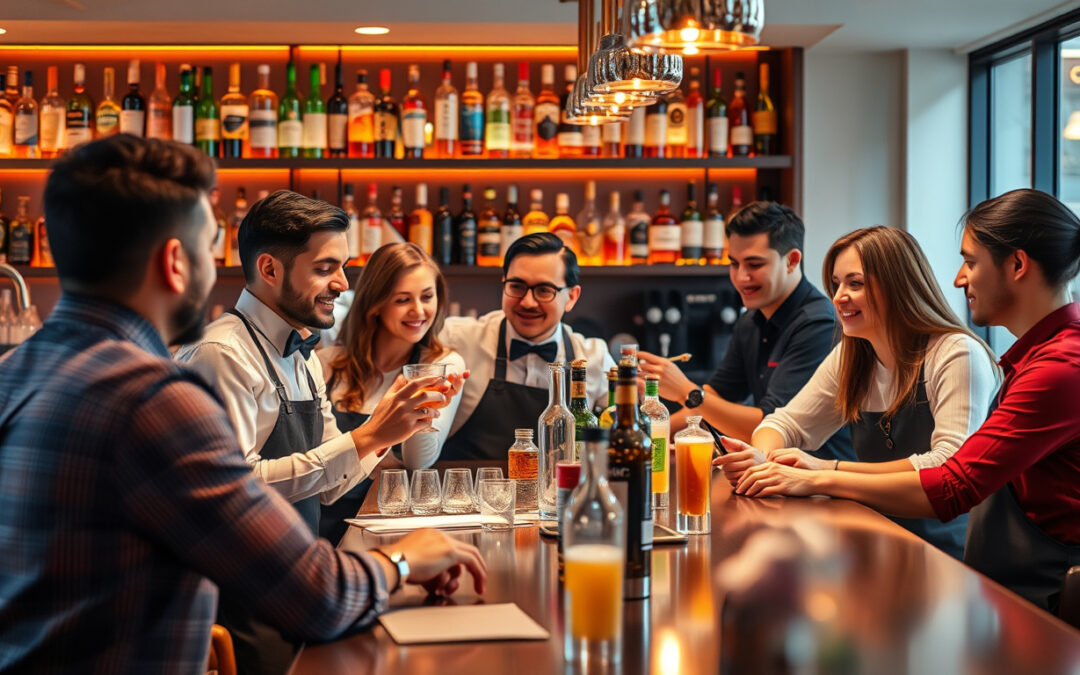
BLOG
Alcohol service training is vital. It builds the skills to serve drinks well. Bartenders, servers, and managers all need to know the rules. This training keeps you legal, supports safety, and builds a strong venue image.
This article covers key skills and explains why training is a must in today’s beverage management.
Why Alcohol Service Training Matters
Training gives staff the power to serve alcohol with care. It cuts risks like accidents, fights, and legal issues. Many places even require training to get a license.
You learn how alcohol affects the body, spot signs of intoxication, and follow local laws. Employers see lower risks while patrons enjoy safer drinks.
Core Components of Alcohol Service Training
Understanding Alcohol and Its Effects
Learning how alcohol works is a key part of training. You explore blood alcohol levels, how intoxication builds, and why people react differently. These facts help you decide when to stop serving.
Identifying Signs of Intoxication
Training shows you the early signs of too much drinking. You learn to see slurred speech, poor balance, or aggression. Spotting these clues helps stop over-serving.
Checking Identification and Avoiding Underage Drinking
Checking IDs is a must. Training teaches how to spot fake IDs and avoid serving minors. This simple step keeps you away from penalties.
Handling Difficult Situations
Whether a customer is upset or too drunk, training helps you stay calm. You learn to handle refusals and diffuse conflicts in a clear, steady way.
Legal Responsibilities and Liabilities
Understanding the law is key. Training explains alcohol laws and penalties. This keeps you compliant and prevents legal troubles.
Practical Skills and Techniques for Responsible Beverage Management
Training is not only about facts. It also builds practical habits:
- Measure drinks to avoid overserving.
- Offer non-alcoholic drinks and food to slow alcohol uptake.
- Suggest safe rides home with a designated driver or ride service.
- Use tools and team checks to control consumption.

Benefits of Alcohol Service Training for Establishments
Training brings many wins:
- Fewer accidents and legal claims.
- A safer, happier customer experience.
- Meeting legal rules easily.
- More confident and skilled staff.
- A better public image for your venue.
How to Implement Effective Alcohol Service Training Programs
When you set up training, keep these points close:
- Choose a certified provider.
- Match training to your venue’s needs.
- Combine classroom talks with role-play.
- Refresh the training often to keep it current.
- Listen to feedback for steady improvement.
Summary: Key Steps for Responsible Alcohol Management
For a safe and compliant service, focus on these points:
- Know how alcohol works and its legal rules.
- Check IDs properly and say no when needed.
- Spot intoxication early.
- Stay calm with difficult customers.
- Offer safe choices and alternatives.
- Keep the training updated.
These steps create a safe, fun, and legal drinking spot.
Frequently Asked Questions About Alcohol Service Training
What is the main goal of alcohol service training?
The main goal is clear. Training gives you the know-how to serve alcohol safely. It stops underage drinking, helps manage intoxication, and keeps you within the law.
How long does alcohol service training typically take?
Training lengths can vary. Some last a few hours; others take a full day. Many places also ask for regular refresher courses.
Who needs alcohol service training?
Anyone who serves or sells alcohol needs this training. That means bartenders, servers, managers, and even event staff must learn these skills.
Training in alcohol service is a must for modern venues. With proper instruction, you meet legal requirements, protect your guests, build trust, and ensure a safer community. For extra details on rules and best practices, check resources like the National Institute on Alcohol Abuse and Alcoholism (source).

BLOG
In today’s regulated retail environment, compliance matters more than ever. Retail staff must learn proper legal sales practices. The LSB Responsible Vendor Training program meets this need. It keeps businesses legal, builds strong operations, and lowers penalty risks.
This article explains LSB Responsible Vendor Training. It covers what the training is, why it matters, its benefits, and how you can use it in your organization.
What is LSB Responsible Vendor Training?
LSB Responsible Vendor Training is a state rule. It educates retail staff on proper sales practices for age-restricted products like alcohol and tobacco. The Liquor and Cannabis Board (LSB) runs the program. LSB checks that vendors follow the law.
The training works by:
• Preventing underage sales.
• Helping staff spot signs of intoxication.
• Clarifying the legal costs of not following rules.
This setup gives vendors clear duties and protects both the community and the store’s name.
Why is LSB Responsible Vendor Training Essential for Retailers?
If you sell alcohol or cannabis, this training is usually required. Ignoring the rule can lead to fines, suspended licenses, or revocation.
Retailers gain by doing the training:
- Legal Compliance: Follow state rules easily.
- Risk Reduction: Cut down on illegal sales and lawsuits.
- Employee Preparedness: Help staff manage tough sales.
- Reputation Management: Build trust with customers and regulators.
Everyone learns their role. The training links actions directly to law, which lowers business risk.
Key Components of LSB Responsible Vendor Training
The training covers topics that support safe retail. These topics build a clear, connected system:
1. Understanding Relevant Laws and Regulations
Staff learn about the laws for selling alcohol, tobacco, and cannabis. They also get clear rules on age limits and licenses.
2. Identification Verification
Employees learn simple steps to check IDs. They also learn to spot fake IDs.
3. Recognizing Signs of Intoxication or Impairment
The training gives clear signs for spotting intoxication. Staff learn to stop a sale when needed.
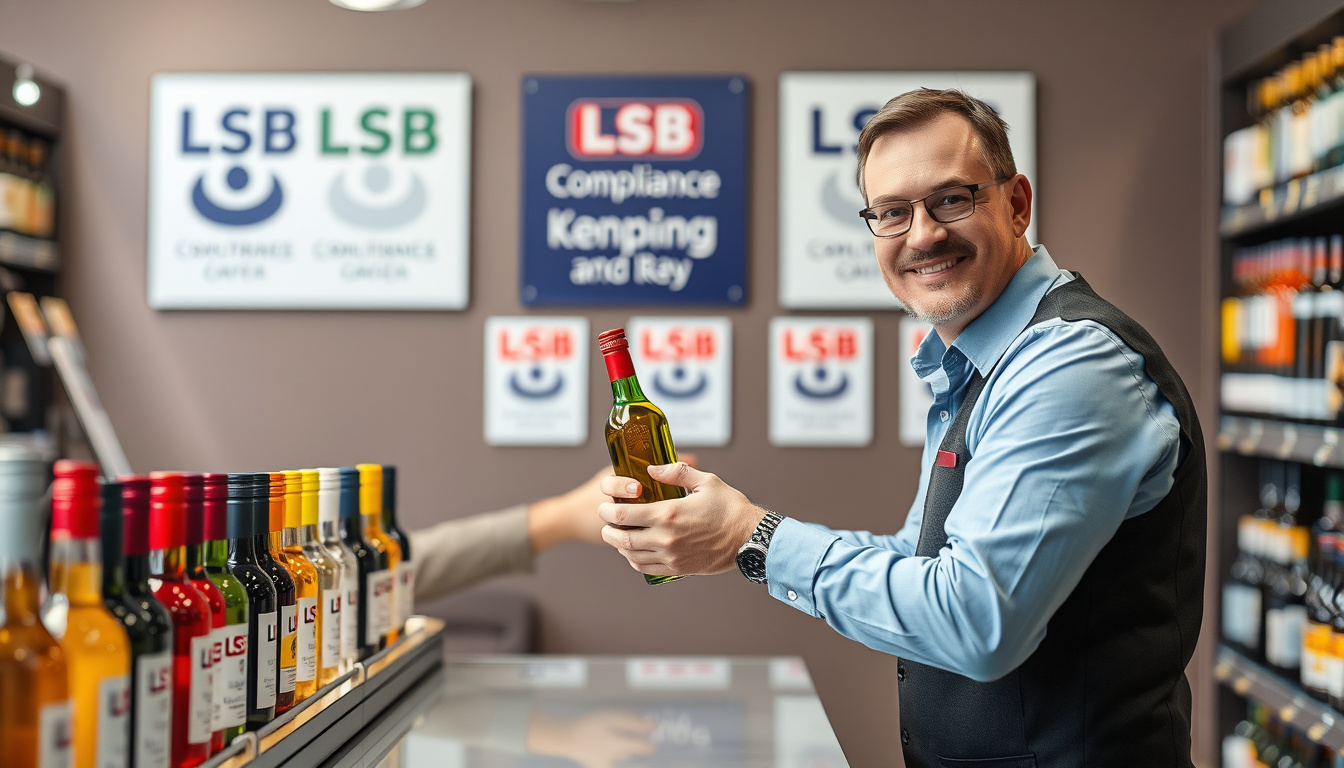
4. Handling Difficult Customer Interactions
Practical examples prepare vendors for tough cases. They learn to say no to illegal or aggressive buying.
5. Consequences of Non-Compliance
The training explains legal and money penalties. It ties every risk directly to non-compliance.
How to Implement LSB Responsible Vendor Training in Your Retail Business
Plan your training carefully. Follow these steps:
-
Identify Responsible Employees
Find out which staff handle regulated product sales. Include cashiers and supervisors.
-
Schedule Training Sessions
Book sessions with LSB-approved courses. Choose in-person or online options.
-
Track Completion
Keep a record of every employee’s training and certificate.
-
Reinforce Learning
Use refresher sessions or team meetings. Update the staff on changes in the law.
-
Enforce Compliance
Monitor sales and run regular audits. This way, you can check that the rules are followed.
Benefits of Ongoing LSB Responsible Vendor Training
One training session is not enough. Retailers must commit to ongoing learning.
Ongoing training helps by:
- Keeping everyone updated with new laws.
- Offering staff a chance to grow in their career.
- Building a safer store for customers.
- Boosting the store’s trust in the community.
When rules link directly to daily work, compliance becomes second nature.
Frequently Asked Questions (FAQs) About LSB Responsible Vendor Training
Q1: What is the main purpose of LSB Responsible Vendor Training?
A1: Its main purpose is to teach retail staff the legal rules and safe sales practices for products like alcohol and cannabis. This stops illegal sales and enhances community safety.
Q2: Who needs to complete the LSB Responsible Vendor Training?
A2: Anyone who sells, serves, or supervises the sale of alcohol, tobacco, or cannabis must take the training. This compliance is required by the state.
Q3: How often should employees renew their LSB Responsible Vendor Training certification?
A3: Usually, the training must be renewed every two years. Check current state rules for any changes or updates.
Conclusion
For retailers selling regulated products, LSB Responsible Vendor Training is a key step for legal and ethical operations. It teaches every employee clear, simple rules for sales. Doing so keeps stores legal, reduces risks, and builds a trusted brand.
To learn more about the training and rules, visit the official Liquor and Cannabis Board website (source).
By choosing LSB Responsible Vendor Training, your retail business works with clarity, safety, and respect for the community.
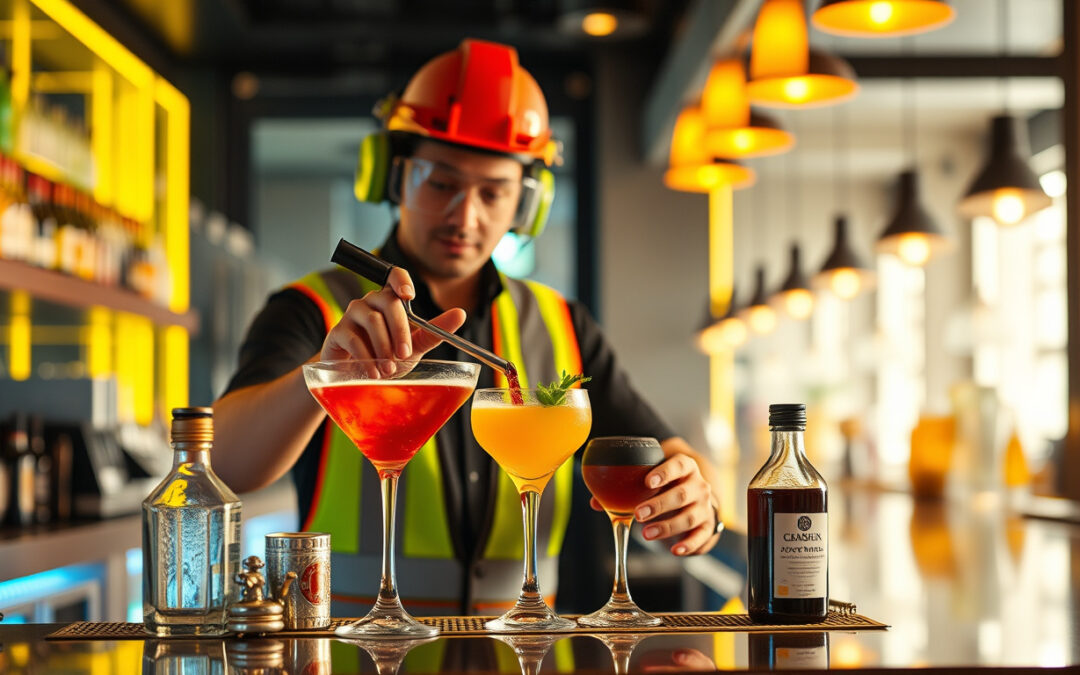
BLOG
In the hospitality field, responsible beverage training is key. It keeps alcohol service safe and legal. Staff learn skills and gain knowledge. They serve alcohol with care. They protect guests and lower legal risks. If you run a bar, restaurant, or event space, you gain much from these programs. They boost safety, ease customer service, and help follow the law.
In this article, we show simple steps. We cover the main practices of safe alcohol service. We explain how it helps your business. We give clear tips for using these ideas. You build a safer space and prove you care for responsible service.
────────────────────────────
What Is Responsible Beverage Training?
Responsible beverage training teaches staff who serve alcohol. It helps bartenders, servers, and managers learn their duties. They see signs of intoxication. They learn to stop service when needed. They get clear tips on handling hard cases and avoiding harm. Training gives them tools to protect health and reduce risks.
This training shows how to:
• Recognize signs of intoxication
• Know local liquor rules
• Use polite refusal skills
• Stop sales to minors
• Prevent drunk driving
When employees learn these skills, they help keep the public safe. They also cut legal risks for your business.
────────────────────────────
Why Responsible Beverage Training Is Important
Training makes legal sense. It is not just a rule to follow. It is a needed step for safe alcohol service. Here are main reasons to use this training:
-
Legal Compliance and Liability Protection
Local and state laws control alcohol service. Breaking these rules, like serving minors or very drunk guests, can bring high fines or closures. Training makes sure staff know and follow these rules.
-
Enhancing Customer Safety
Skilled staff can spot when someone drinks too much. They act to stop accidents or fights. A safe service helps both guests and staff.
-
Improving Employee Confidence and Professionalism
Well-trained employees feel sure in tough moments. They act with care and ease. This skill helps them avoid hard clashes and work better.
-
Promoting a Positive Brand Image
A business that shows care earns trust. Guests and locals feel safe. This trust builds customer ties and long-term success.
────────────────────────────
Essential Practices in Responsible Beverage Training
Good training must cover these points:
Recognizing Signs of Intoxication
Trainees learn to see clear signs. They watch for slurred speech, weak steps, or angry behavior. This helps them know when to stop serving.
Understanding and Verifying Age Restrictions
They learn to check IDs carefully. They spot fake papers. This keeps kids away from alcohol.
Implementing Refusal Skills
Refusing to serve can be hard. Role-play helps staff learn crisp, kind ways to say no. They practice calm words and ways to ease tension.
Managing Difficult Situations
Handling a drunk guest calls for care. Training shows how to stay calm. It explains when to call a manager or the police.
Promoting Responsible Consumption
Staff learn to encourage a light pace. They suggest food or non-drinks. They share info on drink strength to guide choices.

Legal Knowledge and Documentation
Staff learn local alcohol rules. They see the need for accurate records. Keeping logs helps the business if trouble comes.
────────────────────────────
Steps to Implement Responsible Beverage Training in Your Business
Want to start training? Try these steps:
-
Assess Your Business Needs
Look at your venue size and client type. Check your local law requirements.
-
Select a Training Program
Pick a certified training provider. Choose courses that match your local rules.
-
Schedule Regular Training Sessions
Plan initial courses and regular refreshers. All serving staff should join.
-
Use Interactive Training Methods
Bring in role-play, quizzes, and realistic scenarios. These tools help ideas stick.
-
Establish Clear Policies and Procedures
Write down safe alcohol service steps. Share these rules with your team.
-
Monitor and Enforce Compliance
Supervisors watch service practices. They step in when needed and remind staff of the rules.
-
Keep Records
Save training results and incident logs. Records help in audits and legal cases.
────────────────────────────
Benefits Beyond Compliance: How Responsible Beverage Training Positively Impacts Business
Training has gains beyond rule-following:
• Reduced Incidents and Increased Safety
Safer service cuts down fights, crashes, and drunk driving. A safer environment wins.
• Lower Insurance Costs
Some insurers lower rates for businesses with proper training.
• Employee Satisfaction
Staff who know how to act feel proud. They work with more joy and less stress. This cuts turnover.
• Customer Loyalty
Guests see that you care for their safety. This helps build stronger bonds.
• Community Support
A business seen as safe gains local help and trust.
────────────────────────────
Checklist for Effective Responsible Beverage Training
Make sure your program does all this:
[ ] Explains key alcohol rules clearly
[ ] Shows signs of intoxication and proper responses
[ ] Teaches solid ID-checking skills
[ ] Provides tips for polite, firm refusals
[ ] Gives ways to urge moderate drinking
[ ] Uses role-play and quizzes for hands-on practice
[ ] Keeps good records of sessions and events
[ ] Holds regular refresher courses
[ ] Sets clear in-house alcohol policies
────────────────────────────
Frequently Asked Questions About Responsible Beverage Training
What is the main goal of responsible beverage training?
The goal is to teach staff to serve alcohol in a safe, legal way. It cuts risks like underage drinking and over-served guests.
How often should employees undergo responsible beverage training?
Staff begin with training before they serve. Refresher courses come yearly or as local law needs.
Can responsible beverage training reduce my business’s legal risks?
Yes. When staff use the right tools and words, they avoid breaking the law. This cuts the risk of legal trouble.
────────────────────────────
Conclusion
Responsible beverage training is a smart investment. It builds a safe place for guests and protects your business. It shows you care for patrons and follow the law. Pick a quality training program. Engage your team and offer ongoing learning. This way, your venue stays safe and true to high standards.
For more tips on safe alcohol service, visit the National Institute on Alcohol Abuse and Alcoholism (source). Their guides and rules help you serve alcohol with care. With these practices, you lay the base for a trusted and safe hospitality business.
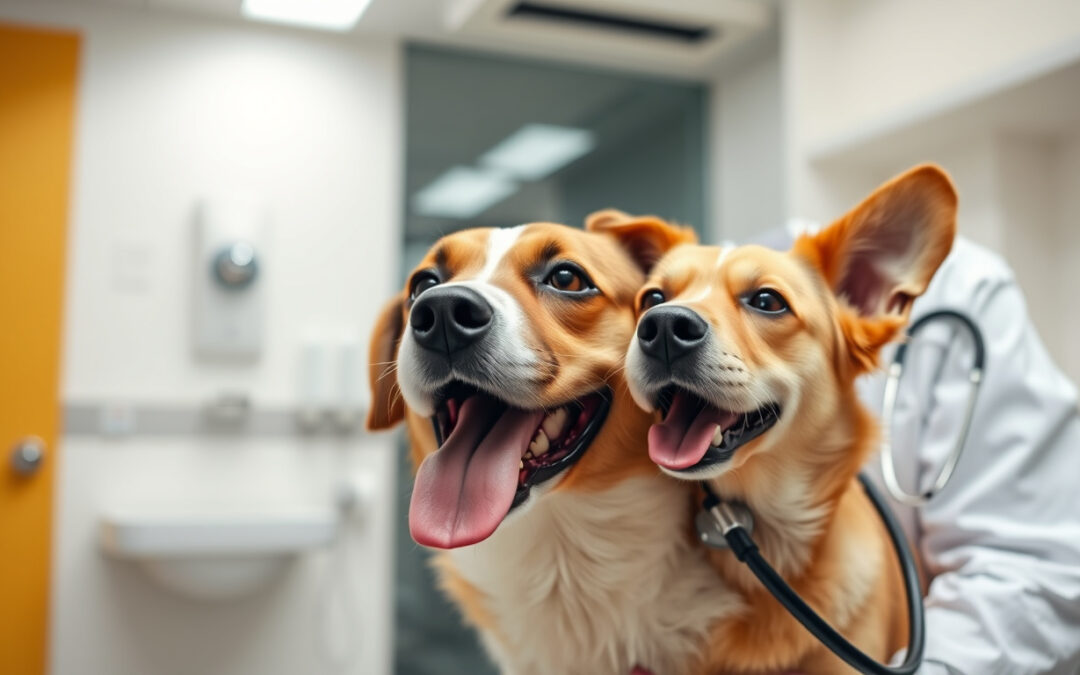
BLOG
If you want to boost your career in veterinary technology, the LSB-RVT certification can change your path.
The LSB-RVT certification validates your skills and knowledge. It builds credibility and opens better job doors.
In this guide, you learn what you need to know about LSB-RVT. We cover eligibility, exam tips, and career benefits.
What Is LSB-RVT Certification?
The Laboratory Specialist Board awards the LSB-RVT certification.
It targets veterinary technologists and technicians who work in laboratory diagnostics.
This certification shows that you can perform and interpret tests.
It is key to supporting animal care in a veterinary team.
Unlike general veterinary technician certifications, LSB-RVT focuses on lab skills.
You learn hematology, clinical pathology, cytology, and molecular diagnostics.
Holding this badge sets you apart and shows your dedication to excellence.
Why Pursue LSB-RVT Certification?
LSB-RVT certification boosts your career in many ways.
Here are some key benefits:
• Professional Recognition: Employers and peers see your skills.
• Improved Job Prospects: Certification leads to higher pay and promotions.
• Expanded Knowledge: You deepen your understanding of diagnostics.
• Networking Opportunities: It helps you connect with colleagues.
• Better Patient Care: Your expertise leads to accurate diagnoses.
Eligibility Requirements for LSB-RVT Certification
Before you apply, you must meet some criteria:
- Educational Background: Finish an accredited veterinary technology program.
This is usually at the associate or bachelor’s level.
- Experience: Gain at least two years of hands-on lab work in a clinical setting.
- Current Credential: Hold the VTNE or a similar certification.
Sometimes, you must supply references and proof of experience.
Check the official LSB website for the latest details.
How to Prepare for the LSB-RVT Exam
Passing the LSB-RVT exam needs focused study and practice.
Follow these steps to prepare:
Understand the Exam Content
The exam tests key veterinary lab skills.
You study topics like:
• Hematology and blood smear analysis
• Urinalysis and body fluid review
• Cytology and sample preparation
• Microbiology and parasite identification
• Lab safety and quality control
Create a Study Plan
Break the material into small sections.
Set a timeline for each topic.
Use these study methods:
• Read textbooks and journals on lab diagnostics.
• Take online courses or join workshops.
• Join study groups or forums to share knowledge.
• Use practice tests and flashcards to challenge yourself.
Gain Practical Experience
Work in a veterinary lab when you can.
Try to perform different diagnostic tests.
Practical work builds your confidence and skills.

Utilize Official Resources
The Laboratory Specialist Board gives you handbooks, sample questions, and more.
These tools help you focus on exam topics.
The LSB-RVT Exam Day: What to Expect
On exam day, keep calm and manage your time.
The test is computer-based and uses multiple-choice and scenario questions.
You must:
• Arrive early with proper ID
• Bring allowed materials like a calculator if needed
• Pace yourself and answer all questions
• Review your answers before submitting
Post-Certification: Maintaining Your LSB-RVT Credential
Earning the LSB-RVT is only the start.
You must meet continuing education standards to keep it.
This ensures you stay updated on lab diagnostics.
Typically, you earn continuing education credits every few years.
Join professional associations and attend workshops to meet the requirements.
Career Opportunities with LSB-RVT Certification
Having LSB-RVT certification opens many doors.
Career paths include:
• Veterinary Laboratory Specialist: Focus on diagnostics and lab management.
• Clinical Research Technician: Work on veterinary studies and trials.
• Veterinary Hospital Lab Supervisor: Lead lab operations in clinics.
• Diagnostic Sales Specialist: Advise labs and hospitals on equipment.
Employers value certification because it shows your skill in producing quality lab results for animal care.
Tips for Success in Your LSB-RVT Career
Make the most of your certification by:
• Keeping up with new lab methods and technologies.
• Volunteering for new projects or leadership tasks.
• Building strong ties with veterinarians and colleagues.
• Considering advanced certifications or degrees to specialize further.
Summary: Start Your LSB-RVT Certification Journey Today
The LSB-RVT certification is a strong step in your career.
It shows your commitment to lab excellence and animal health.
Meet the criteria, study well, and keep learning.
With your certification, better career opportunities and improved animal care await.
Frequently Asked Questions (FAQ)
Q1: What does the LSB-RVT certification stand for?
A1: It stands for Laboratory Specialist Board – Registered Veterinary Technologist. It shows your skill in lab diagnostics.
Q2: How difficult is the LSB-RVT exam?
A2: The exam is challenging. It tests a broad range of lab skills and knowledge. Success comes with hard work and practice.
Q3: Can I apply without prior veterinary technician credentials?
A3: You usually need a basic credential like VTNE and relevant lab experience before you can apply.
For more details and the latest updates on LSB-RVT certification, visit the official Laboratory Specialist Board website or check trusted resources like NAVTA (National Association of Veterinary Technicians in America).
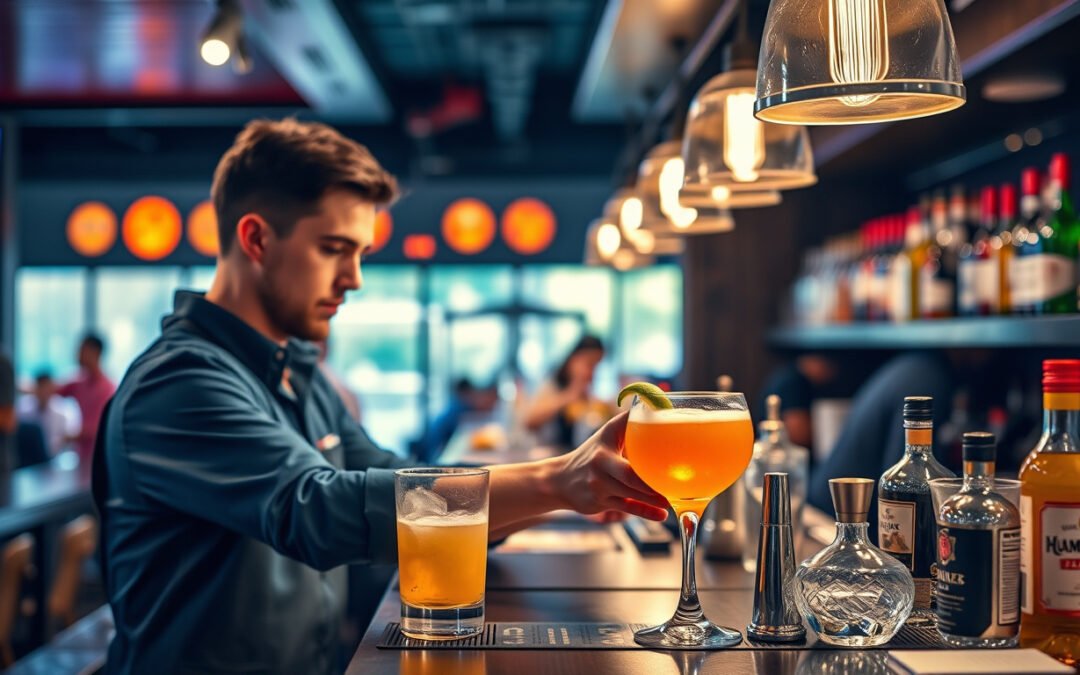
BLOG
Serving alcohol is a big duty. It needs care, skill, and professionalism. A responsible beverage vendor makes the place safe and follows the law. If you run a bar, restaurant, or event space, you must use safe practices. This article shows clear steps every vendor can use to serve alcohol safely.
Understanding the Role of a Responsible Beverage Vendor
A responsible beverage vendor does more than sell drinks. They act as gatekeepers. They stop underage drinking, control intoxication, and reduce harm. They serve alcohol with care, cut risks, and obey the law.
By taking these steps, vendors help make drinking safer. They also protect their business from fines and license loss. It is very important for us all to know how to serve alcohol well.
Key Responsibilities of a Responsible Beverage Vendor
To serve alcohol safely, vendors must use best practices. Below are clear duties that help keep service safe:
1. Verify Age Rigorously
Check IDs to stop underage drinking. Train staff to know real government IDs. Deny service when unsure. Use age-check tools but trust the staff’s watchful eye.
2. Train Staff Thoroughly
Give strong training to bartenders, servers, and managers. This training shows legal rules, signs of drunkenness, and polite ways to refuse service. It also builds skills for tough moments.
3. Monitor Patron Consumption
Watch patrons carefully. Look for early signs of intoxication. Offer water, food, or a ride when needed. This early help can stop problems.
4. Promote Safe Transportation Options
Suggest that patrons use a designated driver, taxi, or ride-sharing service. Some places even give bonuses or work with transport services to help patrons go home safely.
5. Adhere to Legal and Municipal Regulations
Keep up with local liquor laws. Know service hours and occupancy limits. Following these laws stops fines and protects the business’s name.
Essential Practices for Safe Alcohol Service
Using a set plan helps vendors keep safety high. Here are practices that build a safe space for drinking:
Comprehensive Staff Training Programs
- Hold regular training sessions that cover:
- Legal rules and penalties.
- How to spot fake IDs.
- Signs of intoxication.
- Conflict handling and de-escalation.
- Use role-play to build staff confidence in saying no.
Implementing Strict Age Verification Policies
- Ask for a valid photo ID for everyone under 30.
- Use scanning tools when possible.
- Keep records of times service was refused.
Setting and Enforcing Limits on Alcohol Service
- Set strict limits on drinks per hour or per person.
- Show a menu that includes non-alcoholic drinks.
- Give a "last call" warning before closing.
Creating a Safe Physical Environment
- Arrange the space to avoid crowding. Keep exit routes clear.
- Use good lighting to see patrons clearly.
- Train staff to spot and stop scuffles early.
Providing Food with Alcohol Service
- Encourage or require food with drinks.
- Pair food with drinks to slow alcohol absorption.
Encouraging Responsible Drinking Through Communication
- Show posters or table tents that promote moderation.
- Share simple facts about alcohol effects.
- Train staff to talk about safe drinking habits.
Promoting Transportation Alternatives
- Work with designated driver programs or ride-share companies.
- Offer a free or discounted non-alcoholic drink for drivers.
- Give simple travel information to help patrons get home.
Benefits of Responsible Beverage Vendor Practices
Using safe practices brings many benefits:
- Enhanced Safety: Fewer accidents and fights.
- Reputation Management: Builds trust and loyalty.
- Legal Compliance: Stops fines and license loss.
- Community Health: Lowers alcohol abuse and its harms.
Example: How Businesses Benefit from Responsible Beverage Vendor Certification
Some regions offer programs that train vendors and give certificates. Certified staff report fewer legal problems and a better customer experience. Research shows that training reduces drunk driving and injuries (source).

Checklist: Essential Practices for a Responsible Beverage Vendor
- Verify age for every sale.
- Train staff regularly on safe service.
- Watch how much each customer drinks.
- Limit drinks per customer or time.
- Serve food with alcohol.
- Help patrons get home safely.
- Update yourself on local alcohol laws.
- Build a safe, well-lit space.
- Use signs to promote safe drinking.
- Record any incidents and refusals.
Frequently Asked Questions About Responsible Beverage Vendor Practices
What training is required to become a responsible beverage vendor?
Training rules differ by place. Usually, you learn to check age, spot drunkenness, refuse service politely, and know the law. Many areas have certification programs.
How does a responsible beverage vendor prevent serving intoxicated customers?
Staff learn to see signs like slurred speech or shaky movements. They know to limit drinks, serve water, or call for a ride to stop overservice.
Why is it important for a beverage vendor to encourage safe transportation?
Safe transport stops drunk driving. It protects patrons, the community, and your business from legal and public issues.
Safe alcohol service grows from care and skill. Being a responsible beverage vendor means you put your patrons’ safety first and follow the law. By using these clear practices, you help your community and boost your business with professionalism and care.










